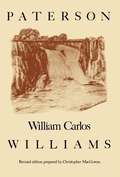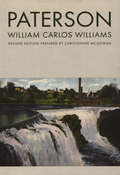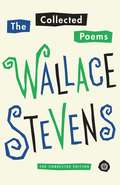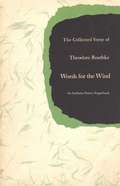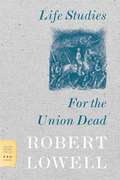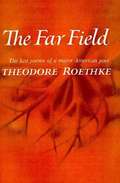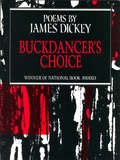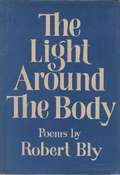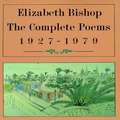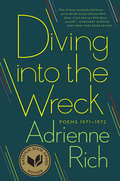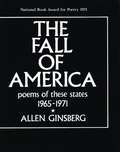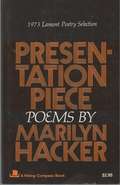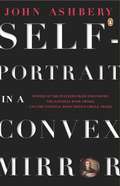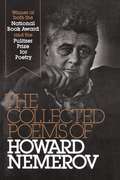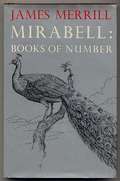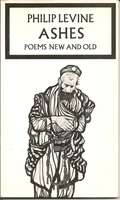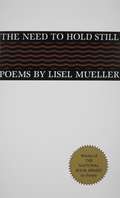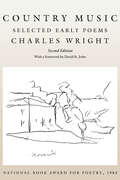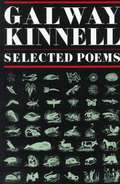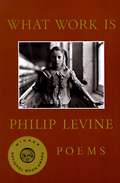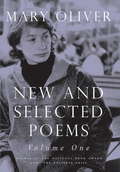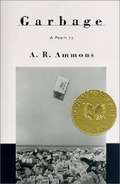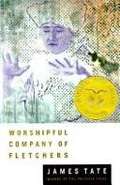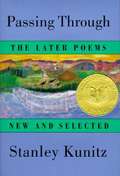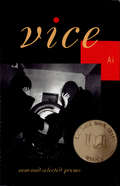Special Collections
National Book Award Winners - Poetry
- Table View
- List View
Paterson
by William Carlos Williams and Christopher J. MacgowanLong recognized as a masterpiece of modern American poetry, William Carlos Williams' "Paterson" is one man's testament and vision. "Paterson" is both a place -- the New Jersey city near which Williams lived -- and a man: the symbolic figure in whom the person (the poet's own life) and the public (the history of the region) are combined.
Winner of the National Book Award
Paterson
by William Carlos Williams and Christopher MacgowanLong recognized as a masterpiece of modern American poetry, WIlliam Carlos Williams' Paterson is one man's testament and vision, "a humanist manifesto enacted in five books, a grammar to help us life" (Denis Donoghue). Paterson is both a place--the New Jersey city in whom the person (the poet's own life) and the public (the history of the region) are combined. Originally four books (published individually between 1946 and 1951), the structure ofPaterson (in Dr. Williams' words) "follows the course of the Passaic River" from above the great falls to its entrance into the sea. The unexpected Book Five, published in 1958, affirms the triumphant life of the imagination, in spite of age and death. This revised edition has been meticulously re-edited by Christopher MacGowan, who has supplied a wealth of notes and explanatory material.
The Collected Poems of Wallace Stevens
by Wallace StevensThis definitive poetry collection, originally published in 1954 to honor Stevens on his 75th birthday, contains:
- "Harmonium"
- "Ideas of Order"
- "The Man With the Blue Guitar"
- "Parts of the World"
- "Transport Summer"
- "The Auroras of Autumn"
- "The Rock"
Winner of the National Book Award
Words for the Wind
by Theodore RoethkeA collection of the Northwest poet's work up until 1958, which won the National Book Award in 1959. Roethke taught poetry and writing at the University of Washington.
Life Studies and For the Union Dead
by Robert LowellThe title poem of For the Union Dead concerns the death of the Civil War hero (and Lowell ancestor) Robert Gould Shaw, but it also largely centers on the contrast between Boston's idealistic past and its debased present at the time of its writing, in the early 1960's. Throughout, Lowell addresses contemporaneous subjects in a voice and style that themselves push beyond the accepted forms and constraints of the time.
Winner of the National Book Award
The Far Field
by Theodore RoethkeWith Roethke's sudden, tragic death in 1963, a great poetic career was brought to an untimely end. "The Far Field" presents the most rewarding of his many volumes of poetry, both in brilliance of style and inner meaning. All of the poems have appeared previously in periodicals such as "The Atlantic Monthly, Harper's, Ladies' Home Journal, The New Yorker", and "The Partisan Review".
Winner of the National Book Award
Buckdancer's Choice
by James DickeyWhoever looks to a new book by James Dickey for further work in an established mode, or for mere novelty, is going to be disappointed. But those who seek instead a true widening of the horizons of meaning, coupled with a sure-handed mastery of the craft of poetry, will find this latest collection satisfying indeed.Here is a man who matches superb gifts with a truly subtle imagination, into whose depths he is courageously traveling--pioneering--in exploratory penetrations into areas of life that are too often evaded or denied. "The Firebombing," "Slave Quarters," "The Fiend"--these poems, with the others that comprise the present volume, show a mature and original poet at his finest.
Winner of the National Book Award
The Complete Poems 1927-1979
by Elizabeth BishopFrom the book: "So many stops and looks But never any listens For a poor man who traps A snowstorm that glistens."
Diving into the Wreck
by Adrienne RichIn her seventh volume of poetry, Adrienne Rich searches to reclaim--to discover--what has been forgotten, lost, or unexplored.
"I came to explore the wreck. / The words are purposes. / The words are maps. / I came to see the damage that was done / and the treasures that prevail." These provocative poems move with the power of Rich's distinctive voice.
Winner of the National Book Award
The Fall of America
by Allen GinsbergBeginning with "long poem of these States," The Fall of America continues Planet News chronicle tape-recorded scribed by hand or sung condensed, the flux of car bus airplane dream consciousness Person during Automated Electronic War years, newspaper headline radio brain auto poesy & silent desk musings, headline flashing on road through these states of consciousness ...
Winner of the National Book Award
Presentation Piece
by Marilyn HackerA collection of surreal poetry, arranged in five parts.
Winner of the National Book Award
Self-Portrait in a Convex Mirror
by John AshberyA collection of poetry by John Ashbery.
Winner of the National Book Award.
Pulitzer Prize Winner
The Collected Poems of Howard Nemerov
by Howard NemerovThe former Poet Laureate of the United States, Nemerov gives us a lucid and precise twist on the commonplaces of everyday life.The Collected Poems of Howard Nemerov won both the National Book Award and the Pulitzer Prize in 1978. "Howard Nemerov is a witty, urbane, thoughtful poet, grounded in the classics, a master of the craft. It is refreshing to read his work. . . . "—Minneapolis Tribune "The world causes in Nemerov a mingled revulsion and love, and a hopeless hope is the most attractive quality in his poems, which slowly turn obverse to reverse, seeing the permanence of change, the vices of virtue, the evanescence of solidities and the errors of truth."—Helen Vendler, New York Times Book Review
Country Music
by Charles WrightA compilation of powerful and moving poems from early in the poet's career. Co-winner of the 1983 National Book Award for Poetry, Country Music is comprised of eighty-eight poems selected from Charles Wright's first four books published between 1970 and 1977. From his first book, The Grave of the Right Hand, to the extraordinary China Trace, this selection of early works represents "Charles Wright's grand passions: his desire to reclaim and redeem a personal past, to make a reckoning with his present, and to conjure the terms by which we might face the future," writes David St. John in the forward. These poems, powerful and moving in their own right, lend richness and insight to Wright's recently collected later works. "In Country Music we see the same explosive imagery, the same dismantled and concentric (or parallel) narratives, the same resolutely spiritual concerns that have become so familiar to us in Wright's more recent poetry," writes St. John.
Selected Poems
by Galway KinnellThe poems include two of Kinnell's most frequently reprinted poems, "Saint Francis and the Sow" and "After Making Love We Hear Footsteps" Kinnell draws for his poetry from experiences living in Vermont and New York, as well as from teaching in France, Australia, Iran, and many colleges and universities in this country. Kinnell is now retired from his position as the director of the Creative Writing Program at New York University.
Winner of the National Book Award
Pulitzer Prize Winner
What Work Is
by Philip Levine"This collection amounts to a hymn of praise for all the workers of America. These proletarian heroes, with names like Lonnie, Loo, Sweet Pea, and Packy, work the furnaces, forges, slag heaps, assembly lines, and loading docks at places with unglamorous names like Brass Craft or Feinberg and Breslin's First-Rate Plumbing and Plating. Only Studs Terkel's Working approaches the pathos and beauty of this book. But Levine's characters are also significant for their inner lives, not merely their jobs. They are unusually artistic, living 'at the borders of dreams.' One reads The Tempest 'slowly to himself'; another ponders a diagonal chalk line drawn by his teacher to suggest a triangle, the roof of a barn, or the mysterious separation of 'the dark from the dark.' What Work Is ranks as a major work by a major poet . . . very accessible and utterly American in tone and language." --Daniel L. Guillory, Library Journal
Winner of the National Book Award in 1991
New and Selected Poems, Volume One
by Mary OliverWhen New and Selected Poems, Volume One was originally published in 1992, Mary Oliver was awarded the National Book Award. In the fourteen years since its initial appearance it has become one of the best-selling volumes of poetry in the country. This collection features thirty poems published only in this volume as well as selections from the poet's first eight books.
Mary Oliver's perceptive, brilliantly crafted poems about the natural landscape and the fundamental questions of life and death have won high praise from critics and readers alike. "Do you love this world?" she interrupts a poem about peonies to ask the reader. "Do you cherish your humble and silky life?" She makes us see the extraordinary in our everyday lives, how something as common as light can be "an invitation/to happiness,/and that happiness,/when it's done right,/is a kind of holiness,/palpable and redemptive." She illuminates how a near miss with an alligator can be the catalyst for seeing the world "as if for the second time/the way it really is." Oliver's passionate demonstrations of delight are powerful reminders of the bond between every individual, all living things, and the natural world.
Winner of the National Book Award
Garbage
by A. R. AmmonsA book-length poem, "Garbage" is an epic of ideas: all life -- not that of human beings alone, but every species -- is shown to be part of an ultimate reality. Eternity is here and now. The argument ranges widely with a wealth of images taken from science, and the world around us, the writing by turns impassioned and witty.
Winner of the National Book Award
Worshipful Company of Fletchers
by James TateMasterfully drawing on a variety of voices and characters, James Tate joyfully offers his first book since winning the Pulitzer Prize in 1992 for his "Selected Poems."
Winner of the 1994 National Book Award for poetry.
Passing Through
by Stanley KunitzStanley Kunitz, one of the masters of contemporary poetry, presents his ninth collection, gathering a rich selection of his work, including new poems that remind us of his prefatory statement: "Art is the chalice into which we pour the wine of transcendence." Nearly all the poems of Kunitz's later years, beginning with The Testing-Tree (1971), are included, and most of the poems in Passing Through are unavailable in any other edition.
In "Touch Me," the last poem in the collection, Kunitz propounds a question, "What makes the engine go?" and gives us his answer: "Desire, desire, desire." These poems fairly hum with the energy, the excitement, the ardor, that make Kunitz one of our most enduring and highly honored poets. In the words of Carolyn Forché, "he is a living treasure."
Winner of the National Book Award
Vice
by AiCollected here are poems from Ai's previous five books--Cruelty, Killing Floor, Sin, Fate, and Greed--along with seventeen new poems. Employing her trademark ferocity, these new dramatic monologues continue to mine this award-winning poet's "often brilliant" (Chicago Tribune) vision.
Winner of the National Book Award
